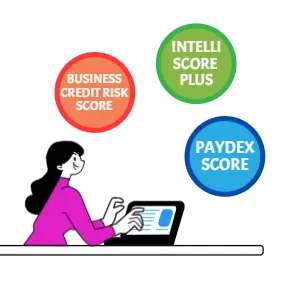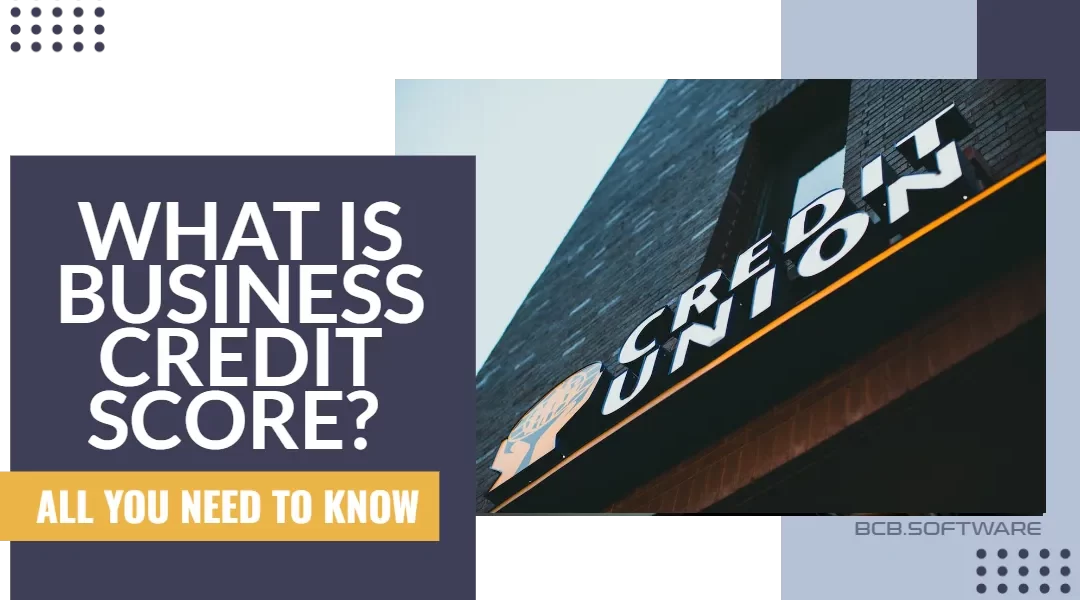Business credit scores are numerical ratings used to assess a business’s creditworthiness. Like a personal credit score, a business credit score can be used by lenders to evaluate the risk of lending money. Or doing business with a particular company.
Business credit scores are typically based on various factors.
- A company’s payment history
- The amount of debt it carries
- Its length of time in business, and
- Other publicly available financial information
The Importance of Business Credit Scores

When a business applies for a loan, lenders will often check the business’s credit score from one or more major credit reporting agencies. A high score indicates that the business has a strong credit history and is less risky to lend to. On the other hand, a low score suggests that the business may have trouble repaying loans.
As a company owner, it is important to have a good understanding of your business credit report for many reasons:
 It can affect your ability to obtain funds.
It can affect your ability to obtain funds.
A low credit score or negative data on your credit report can make it more difficult to obtain financing from lenders or investors. It can also result in higher interest rates and stricter terms for loans.
 It can affect your ability to get credit and favorable terms from suppliers.
It can affect your ability to get credit and favorable terms from suppliers.
A good credit score can help you get credit and more favorable terms from suppliers. This can help you manage your cash flow and grow your business.
 It can affect your ability to get insurance and bonds.
It can affect your ability to get insurance and bonds.
Insurers and bond underwriters may use your credit report to evaluate your business. And decide whether to provide coverage and at what cost.
 It can help you identify and prevent fraud.
It can help you identify and prevent fraud.
Regularly monitoring your credit report can help you identify and prevent fraudulent activity on your accounts, such as unauthorized charges or false accounts.
 It can help you identify and correct errors.
It can help you identify and correct errors.
Credit reports may contain errors, which can negatively impact your credit score. By regularly monitoring your credit report, you can identify errors and take steps to correct them. As a result, this can improve your score over time.

Does business credit affect personal credit?
It is important to note that while personal and business credit scores are related, they are separate.
A business credit score is not directly affected by an individual’s credit score. Because it is based on the business’s credit history rather than an individual’s. However, personal credit can be considered a factor when applying for a business loan or credit card. This is because some lenders may consider the creditworthiness of the business owner.
In addition, for a small business or start-up without a significant credit history, the owner’s credit score may be considered a proxy for the business’s credit reports.

How to find my business credit score?
There are several ways to find your business credit score, depending on the credit reporting agency that has calculated it.
Lenders often check businesses’ credit reports and scores from multiple credit reporting agencies to evaluate their creditworthiness. This is because each agency may have different information on a business. In addition, some agencies may specialize in providing credit information on certain industries.
What business credit reporting agencies do lenders mostly check?
 Dun & Bradstreet (D&B)
Dun & Bradstreet (D&B)
D&B is one of the oldest and most well-established credit reporting agencies. Lenders widely use the PAYDEX score to evaluate a business’s payment history, financial stability, and legal information about the business.
 Experian Business
Experian Business
Experian is another major credit reporting agency for businesses. In addition, lenders often use Experian’s Intelliscore Plus score to evaluate a business’s overall creditworthiness.
 Equifax Business
Equifax Business
Equifax is one of the largest credit reporting agencies. Its Business Credit Risk Score is also widely used by lenders to evaluate a business’s credit risk.
 FICO SBSS (Small Business Scoring Service)
FICO SBSS (Small Business Scoring Service)
The FICO SBSS score is used by the Small Business Administration (SBA) to evaluate the creditworthiness of loan applicants. The score ranges from 0 to 300, with a higher score indicating a lower credit risk.
You can obtain your FICO SBSS score by working with a lender participating in the SBA loan program. In addition, some banks and lending institutions authorized by SBA offer the score to their applicants. However, unlike other business credit reports, the FICO SBSS score is not readily available to the general public.
The FICO SBSS score can be accessed through the lender’s website or by request. In addition, it is often used as one of the requirements to get approved for an SBA loan.
For D&B, Experian Business, and Equifax Business, you can get a credit report and score online through their websites. Here are the links.
The specific credit reporting agencies that lenders check will depend on the lender and the industry of the business in question. For example, some specialized lending institutions like SBA may only use certain score providers (like FICO SBSS) as a requirement for their lending process. Also, some lenders may use alternative data such as cash flow, revenues, and other non-traditional data in their credit decisions.
To learn more about the different types of business credit scores, read this article.
Conclusion:
Overall, having a good understanding of your business credit profiles across multiple credit reporting agencies can help you:
- Make more informed decisions about managing your business.
- Securing financing. And
- Take the necessary steps to improve your credit score.
Looking for a simple way to build business credit?
Get Business Credit Builder Software – Business Credit Machine
a powerful tool to build business credit for your company or your clients’ companies as a business credit builder specialist.
We offer a Free, No-Pressure Live Presentation
Now that you understand the importance of business credit, learn how to build strong business credit for your company by reading these helpful articles below.










 Experian Business
Experian Business

Recent Comments